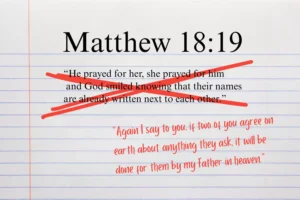I once served on a church nominating committee, seeking volunteers to serve on other boards and committees. It was a brief experience but a memorable one: For a couple of months, lots of people stopped making eye contact with me. Church members I used to chat with or exchange smiles with after services would look away the moment they saw me so much as glance at them across the room.
OK, I get it. I’m not always thrilled to be asked to do certain jobs either. (Having to ask other people to volunteer is one of them.) But you know what? You don’t have to hide behind non-verbals. You can say “no.” In fact, sometimes you should say “no.” When you have too many prior commitments, especially family commitments. When you’re wrong for the job. (I have no aptitude for money matters, so if someone asks me to handle church finances, they’re asking the wrong guy.) Or when you’re just plain burnt out. That last one is familiar territory for me. After several years of doing a lot of work in church, I got burnt out on meetings and activities. I took a few years off before I started serving again.
Often, of course, our reasons aren’t so legit. We don’t want to be asked because we know we should say “yes.” We’re afraid that if someone corners us long enough to ask, we either will say “yes,” or we’ll say “no” and feel ashamed about it.
Examining your heart is a job for you and the Holy Spirit. But I can tell you a couple of things from the perspective of someone who’s been a volunteer, then took a long break, then returned to service.
One is a cliche: Many hands make light work. Or at least lighter work. Even the simple stuff. As an elder, one of the many things I do is find people to serve as ushers, a necessary but easy job. We’d rather not call on the same people all the time; we’d like to let everyone spend the whole service with their families more often than not. We don’t always have that choice, however. The more people who volunteer, the more often we can do that. Be an usher, and you make someone else’s experience of the service better, even if you don’t know whose.
The same principle applies across the board. Not everyone can do every job, but virtually everyone can do something. And then nobody has to burn out.
The other thing I’ve found is that service can have rewards you might not have expected going in. Beyond the knowledge that you’re doing valuable work, there’s a deepening fellowship you can find in serving together with your brothers and sisters in Christ. You can get to know them better, sometimes in ways you wouldn’t just by socializing. You can develop an appreciation for each other’s gifts and degree of dedication. You can get a fuller picture of how God is working in and through your church, and a greater sense of thankfulness for the people He has placed in it.
Case in point: Once a month (sometimes more), I meet with the other members of my church’s board of elders, along with the pastors. As we deal with various, often-weighty issues, I find myself constantly growing in respect and regard for these men — their love for the Lord and His Word, their concern for the members of the church, their devotion to doing the right things for the right reasons. I wouldn’t know them this way without the privilege of serving with them, and I’m much the richer for it.
If you’re serving for the right reasons, you don’t go into it looking for rewards. But the rewards are there. I’m sure some of you know what I’m talking about. (Let’s hear your stories.) For those of you who don’t, though, you just may have some pleasant surprises waiting when you step up to serve.
Copyright 2013 Matt Kaufman, All rights reserved.











